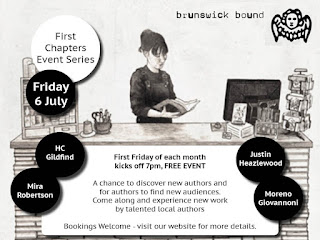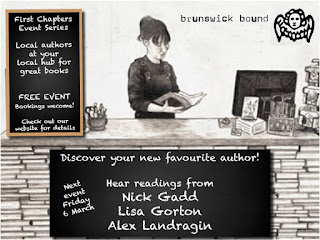First Chapters Q&A with Elizabeth Kuiper
Elizabeth Kuiper grew up in Zimbabwe before immigrating to Perth with her mother. In 2016 she graduated from University of Melbourne with a degree in politics and philosophy. An early extract of Little Stones was shortlisted for the Richell Prize, received the Express Media prize for best work of fiction and was published in Award Winning Australian Writing. Elizabeth is currently studying Law at University of Melbourne.
Elizabeth will be reading from Little Stones at First Chapters on Friday 5 July.
1. Brunswick Bound has asked you to read a piece from your published work. Tell us what we can expect from the piece you have chosen?
I’ve chosen an excerpt from the first chapter of Little Stones. The piece introduces the reader to many of the main characters in the novel (Hannah, her mother and her grandparents) and to a place Hannah is very fond of, her grandparent’s tobacco farm. It also introduces a potential conflict on the horizon. We hear about the War Veterans – War Vets – who are targeting white farmers as part of Mugabe’s land reclamation process. Hannah starts to wonder if maybe her grandparent’s farm could be next.
2. How would you describe the kind of books that you write?
Well, Little Stones is the first book I have written, so I can only really speak to the kind of book it is. I’d describe it as a coming-of-age drama set against a backdrop of a country in turmoil. I’d also say it’s a book that deals with complex issues in an accessible way (largely due to the reader inhabiting the perspective of the child-protagonist).
3. What was the first book that you read (or had read to you) that left an impression on you?
When I was quite young, I had a series of educational children’s books, each one about a different historical era (from memory: the stone age, the middle ages, the renaissance, and the modern age). Their pages were full of great pictures and I found them incredibly interesting to read. I think I mainly liked all the gruesome stories and the odd superstitions from societies past. The series definitely achieved its goal – to get a 5/6-year-old excited about history. I wish I could remember what the books were called – it would be lovely to look them up for nostalgia’s sake.
4. Do you believe that books should answer life’s big questions?
Not necessarily. I have a soft spot for aeroplane thrillers, and I think Helen Fielding’s Bridget Jones’ Diary is excellent (and I won’t have anyone who hasn’t read it tell me otherwise). I don’t want to be reading Camus when I’m at the beach. Books that engage with great philosophical and existential questions are brilliant, but books that simply provide a place for the reader to escape to are really great too.
5. Do you have any writing quirks?

I’m not at all particular about where or when I write. I’ve worked on stories when I should be paying attention to a lecture, or while someone else is watching TV. I also used to write while I was at work (admittedly at a small art gallery with not very many daily visitors). I’m generally not pedantic and pretty good at blocking out the outside world.
6. What is your favourite word or phrase?
One of the perks of studying law is learning lots of lovely-sounding Latin phrases. A favourite and recent addition to my vocabulary is ‘animus possidendi’ – the intention to possess. It’s just really fun to say.
7. What have you found most surprising about publishing a book?
I didn’t expect that it would be a way for me to reconnect with a lot of people. Old high school friends – some of whom I’ve not seen for six or more years – have reached out to tell me they bought a copy of Little Stones and that they loved it. I’ve found it heart-warming that even after moving from Perth to Melbourne, and having lost touch with a lot of folks, that they have all been so supportive of me and the book.
8. What is the question that you hope never to be asked in an author Q&A?
How I plan on juggling a career in writing with a career in the law, or if that’s even possible. It’s a question I’ve received a lot and I don’t have an answer. I would be more than happy to receive lots of advice though.
9. What question do you hope you will be asked and why?
What I hoped to achieve with the novel. I know that ‘death of the author’ means that it’s up to the reader to create their own meanings. Authorial intention is broadly irrelevant. And I completely agree. However, I do like to be able to share what my goals were, the reasons I incorporated particular scenes or had characters behave a particular way. It may not change the way that people read my book but could offer some additional insights.
10. Which author that you have read do you think should be better known or more widely read?
I’m a huge Roxane Gay fan – as are many, many, many others. However, a lot of people I know seem to have only engaged with her non-fiction work (political essays, cultural critiques and so on). She’s an excellent fiction writer too and just as insightful and dry and self-aware in her stories. So yes, even though Gay already has a substantial fanbase, I think her storytelling abilities deserve more credit.
Find out more about the First Chapters event series on the Brunswick Bound website.
Elizabeth will be reading from Little Stones at First Chapters on Friday 5 July.
1. Brunswick Bound has asked you to read a piece from your published work. Tell us what we can expect from the piece you have chosen?
I’ve chosen an excerpt from the first chapter of Little Stones. The piece introduces the reader to many of the main characters in the novel (Hannah, her mother and her grandparents) and to a place Hannah is very fond of, her grandparent’s tobacco farm. It also introduces a potential conflict on the horizon. We hear about the War Veterans – War Vets – who are targeting white farmers as part of Mugabe’s land reclamation process. Hannah starts to wonder if maybe her grandparent’s farm could be next.
2. How would you describe the kind of books that you write?
Well, Little Stones is the first book I have written, so I can only really speak to the kind of book it is. I’d describe it as a coming-of-age drama set against a backdrop of a country in turmoil. I’d also say it’s a book that deals with complex issues in an accessible way (largely due to the reader inhabiting the perspective of the child-protagonist).
3. What was the first book that you read (or had read to you) that left an impression on you?
When I was quite young, I had a series of educational children’s books, each one about a different historical era (from memory: the stone age, the middle ages, the renaissance, and the modern age). Their pages were full of great pictures and I found them incredibly interesting to read. I think I mainly liked all the gruesome stories and the odd superstitions from societies past. The series definitely achieved its goal – to get a 5/6-year-old excited about history. I wish I could remember what the books were called – it would be lovely to look them up for nostalgia’s sake.
4. Do you believe that books should answer life’s big questions?
Not necessarily. I have a soft spot for aeroplane thrillers, and I think Helen Fielding’s Bridget Jones’ Diary is excellent (and I won’t have anyone who hasn’t read it tell me otherwise). I don’t want to be reading Camus when I’m at the beach. Books that engage with great philosophical and existential questions are brilliant, but books that simply provide a place for the reader to escape to are really great too.
5. Do you have any writing quirks?

I’m not at all particular about where or when I write. I’ve worked on stories when I should be paying attention to a lecture, or while someone else is watching TV. I also used to write while I was at work (admittedly at a small art gallery with not very many daily visitors). I’m generally not pedantic and pretty good at blocking out the outside world.
6. What is your favourite word or phrase?
One of the perks of studying law is learning lots of lovely-sounding Latin phrases. A favourite and recent addition to my vocabulary is ‘animus possidendi’ – the intention to possess. It’s just really fun to say.
7. What have you found most surprising about publishing a book?
I didn’t expect that it would be a way for me to reconnect with a lot of people. Old high school friends – some of whom I’ve not seen for six or more years – have reached out to tell me they bought a copy of Little Stones and that they loved it. I’ve found it heart-warming that even after moving from Perth to Melbourne, and having lost touch with a lot of folks, that they have all been so supportive of me and the book.
8. What is the question that you hope never to be asked in an author Q&A?
How I plan on juggling a career in writing with a career in the law, or if that’s even possible. It’s a question I’ve received a lot and I don’t have an answer. I would be more than happy to receive lots of advice though.
9. What question do you hope you will be asked and why?
What I hoped to achieve with the novel. I know that ‘death of the author’ means that it’s up to the reader to create their own meanings. Authorial intention is broadly irrelevant. And I completely agree. However, I do like to be able to share what my goals were, the reasons I incorporated particular scenes or had characters behave a particular way. It may not change the way that people read my book but could offer some additional insights.
10. Which author that you have read do you think should be better known or more widely read?
I’m a huge Roxane Gay fan – as are many, many, many others. However, a lot of people I know seem to have only engaged with her non-fiction work (political essays, cultural critiques and so on). She’s an excellent fiction writer too and just as insightful and dry and self-aware in her stories. So yes, even though Gay already has a substantial fanbase, I think her storytelling abilities deserve more credit.
Find out more about the First Chapters event series on the Brunswick Bound website.




Comments
Post a Comment